Kay Ivey participates in groundbreaking ceremony for restoration of Historic Brown Chapel AME Church
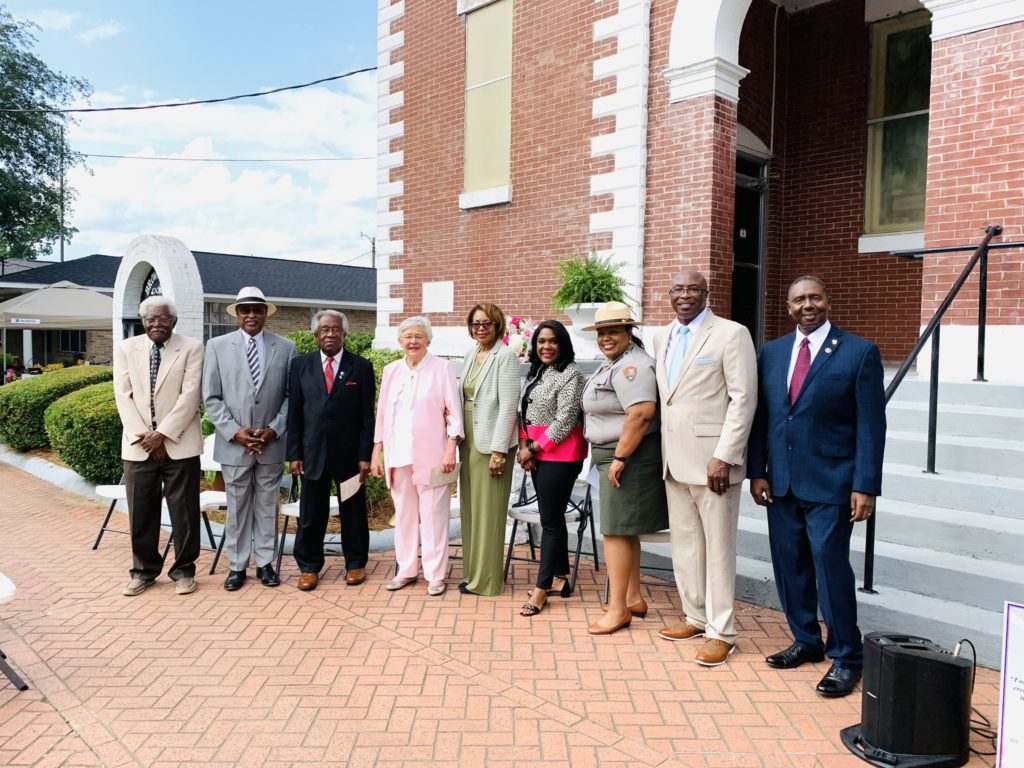
Last Wednesday, Governor Kay Ivey participated in a groundbreaking ceremony for the Restoration Project of the Brown Chapel AME Church in Selma, AL. Built in 1908, Brown Chapel will receive a $1.3 million grant from the National Park Service for the church’s restorations and repairs, including electrical work, roof work, and cupola repairs. The church serves as a historic Civil Rights landmark, originally gaining notoriety for its role in “Bloody Sunday,” which served as a catalyst for the Voting Rights Act of 1965. A recent press release from the Office of Governor Kay Ivey stated, “In the 1960s, the Brown Chapel AME Church became widely-known during the Voting Rights Movement for the “Bloody Sunday” confrontation and the subsequent march from the church to the state capitol in Montgomery. In March 1998, Brown Chapel AME Church was awarded the distinctive status of a National Historic Landmark for its significant participation in the struggle for equality and justice for all people.” On Twitter, she commented, “It was truly an honor to join Brown Chapel AME Church for the groundbreaking of their $1.3 million restoration project. This National Historic Landmark church’s legacy with the Civil Rights Movement will on for future generations.” It was truly an honor to join Brown Chapel AME Church for the groundbreaking of their $1.3 million restoration project. This National Historic Landmark church’s legacy with the Civil Rights Movement will live on for future generations. #alpolitics pic.twitter.com/4UVhdtYVvY — Governor Kay Ivey (@GovernorKayIvey) June 23, 2021 Ivey reflected on Selma’s rich history in the fight for Civil Rights during her speech last week, “These new renovations will add to the significance of this historic landmark and continue to showcase the deep-rooted history of the civil rights movement and the city of Selma.” Congresswoman Terri Sewell, Selma Mayor James Perkins, and former Alabama GOP Chair Terry Lathan, among other state leaders, were also in attendance at the ceremony. Sewell recalled attending the church in her youth with her family and thanked the National Park Service during her speech at the ceremony. “It’s always good to be back in Selma,” Sewell expressed. “This $1.3 million grant from the National Park Service will do is to ensure that America’s story lives on, that we who are members of this great church are not alone in preserving it because this church is a part of America’s history.” Rep. Sewell stated on Twitter, “Brown Chapel AME has always symbolized the rich history of the Civil Rights Movement and remains critical to understanding where our nation stands today. This $1.3 million grant ensures that it will be preserved not only in our hearts, but also in American History.” Brown Chapel AME has always symbolized the rich history of the Civil Rights Movement and remains critical to understanding where our nation stands today. This $1.3 million grant ensures that it will be preserved not only in our hearts, but also in American History. pic.twitter.com/rwvCTsdXQp — Rep. Terri A. Sewell (@RepTerriSewell) June 23, 2021
Democratic presidential hopefuls honor Selma march
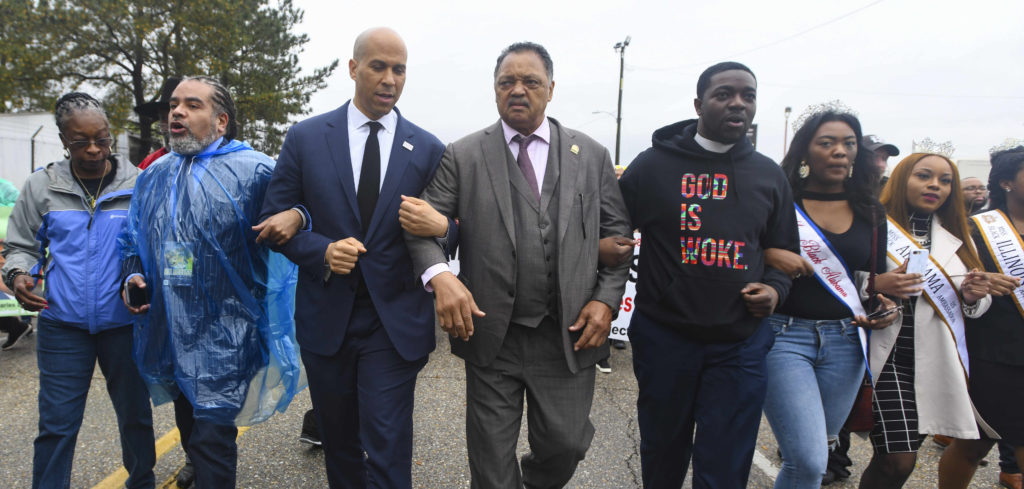
Thunder rolling above Brown Chapel AME Church, Democratic presidential candidate Cory Booker warned Sunday of a looming threat to American democracy and called for protecting the legacy of the civil rights movement with love and action. “It’s time for us to defend the dream,” Booker said in a keynote speech at Brown Chapel, which two generations ago was the starting point of a peaceful demonstration in support of voting rights that ended in beatings on the Edmund Pettus Bridge. The infamous “Bloody Sunday” on March 7, 1965, galvanized support for the passage of the Voting Rights Act that year. “It’s time that we dare to dream again in America. That is what it takes to make America great. It is up to us to do the work that makes the dream real,” said Booker, a New Jersey senator and one of three White House hopefuls who participated in events commemorating the march. Saying America faces challenges, Booker said: “People want to make it just about the people in the highest offices of the land. . People who traffic in hatred, people in office that defend Nazis or white supremacists, people that point fingers and forget the lessons of King. What we must repent for are not just the vitriolic words and actions of bad people, but the appalling silence and inaction of good people.” Also visiting Selma on Sunday were Sens. Bernie Sanders of Vermont and Sherrod Brown of Ohio. Joining them was Hillary Clinton, the Democratic nominee in 2016. Booker and Brown, along with Clinton and civil rights leader Jesse Jackson, marched with dozens of others Sunday afternoon to Edmund Pettus Bridge. Sanders had left for a campaign event in Chicago. The throng of marchers had set out from the church and sang freedom songs under a stormy sky as they headed to that sacred spot over the Alabama River to commemorate the peaceful protesters who were met with tear gas and clubs wielded by state troopers. This year’s commemoration came in the early days of a Democratic presidential primary campaign that has focused heavily on issues of race. Several candidates have called President Donald Trump a racist, while others have voiced support for the idea of reparations for the descendants of enslaved black Americans. Booker and Sanders have already announced their campaigns. Brown is still considering a White House bid. The three gathered for a unity breakfast in Selma to pay homage to its civil rights legacy and highlight how the movement shaped their personal narratives. For the New Jersey senator, much of the day felt personal. In Brown Chapel he sat next to Jackson, for whom he cast his first ballot as an 18-year-old during Jackson’s 1988 presidential campaign. He later marched to the bridge alongside Jackson, their arms locked together. In his speech, Booker linked the 1965 Selma demonstration to the lawyer who volunteered to help his family buy a home in a white neighborhood after they were discriminated against and repeatedly denied. “I would not be here if it wasn’t for marchers on a bridge who inspired a man a thousand miles away in New Jersey,” he said. “The dream is under attack. You honor history by emulating it, by us recommitting ourselves to it.” Brown, currently on a “Dignity of Work” tour inspired by King, returned to Selma for the fifth time. He frequently draws connections between civil rights and worker’s rights. A former secretary of state in Ohio, Brown also has a reputation as a leader on expanding voter participation. “We need to understand what happened here and we need to talk about it so we keep fighting on these issues,” Brown told reporters at the breakfast. “It’s clear we make progress and then we fall back because of Republican attacks on voting rights.” Claiming that the Georgia governor election was stolen from Democrat Stacey Abrams, Brown said: “It’s not just a Southern issue, of course. In the north we see all kinds of changes in voting laws. We see suppression of the vote in 2016, purging of voters in my state in a big way. This fight continues. It’s become personal in many ways because voting rights are so important to our country.” Sanders attended the 1963 March on Washington, which featured the Rev. Martin Luther King Jr.‘s “I Have A Dream” speech. Sanders has highlighted his civil rights and activist background as a young man at the University of Chicago. He is working to strengthen his relationship with black voters, with whom he struggled to connect in the 2016 Democratic primary that Clinton won. Appearing at Chicago’s Navy Pier, Sanders on Sunday night recalled his work with the campus chapter of the Congress of Racial Equality, protesting discrimination and housing segregation. He led one of the first sit-ins in the North and was arrested at a demonstration against segregation in Chicago schools in 1963. Sanders said while the Chicago activism was significant at the time, it didn’t compare to what was happening in the South. “We were protesting,” he told a rally of thousands. “They were putting their lives on the line, and some were getting killed.” “I must say that it is incomprehensible to me that, in the year 2019, we continue to have a president, a Supreme Court and Republican governors who still are trying to deny people of color and poor people the right to vote,” he said. “The reason I tell you all of this is because my activities here in Chicago taught me a very important lesson,” he said. “And that is that whether it is the struggle is against racism, or sexism, or homophobia, or corporate greed, or environmental devastation, or war and militarism or religious bigotry — real change never takes place from the top on down. It always takes place from the bottom on up when people, at the grassroots level, stand up and fight back.” In Selma, Clinton told those at Brown Chapel that the absence of crucial parts of the
Hillary Clinton to attend Selma’s annual Jubilee Bridge Crossing
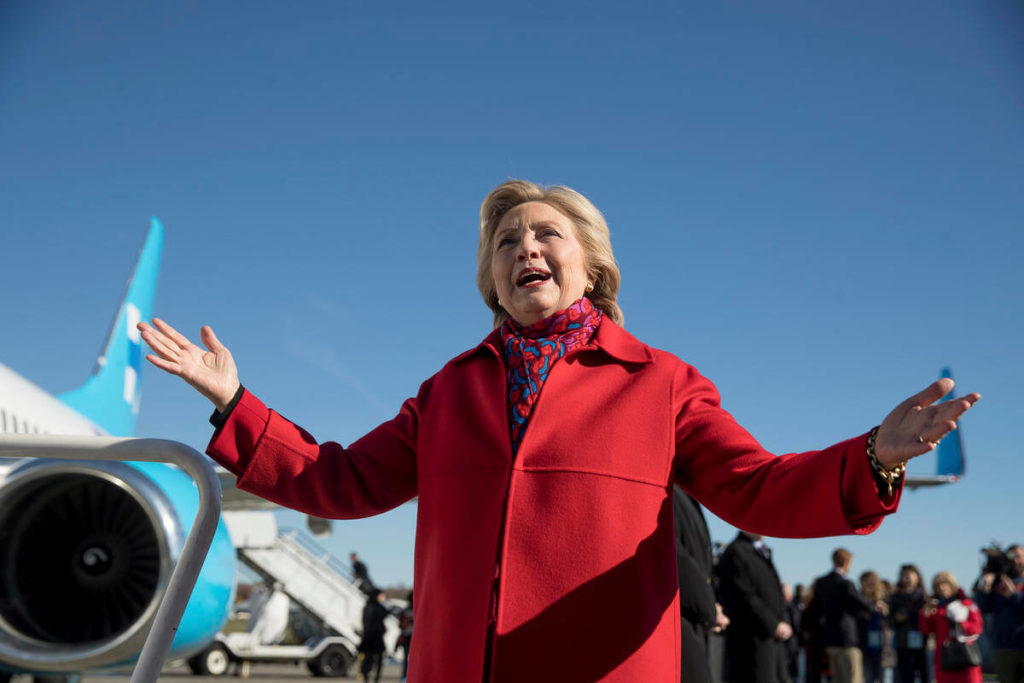
On Friday, March 1 through Sunday, March 3, Selma, Ala. will host the largest voting rights commemoration event in the country — the Bridge Crossing Jubilee — remembering the 54th anniversary of the Selma to Montgomery “Bloody Sunday” march, and according to event organizers a former First Lady will be in attendance. According to the Alabama News Network, Jubilee organizers say former First Lady and U.S. Sen. Hillary Clinton will be at this year’s event. This annual event commemorates “Bloody Sunday,” when on March 7, 1965, a group of roughly 525 African American protesters planned to cross the Edmund Pettus Bridge on their civil rights march to Montgomery to demand the right to vote. At the bridge they where they were met by more than 50 state troopers and a few dozen men on horseback. When the demonstrators refused to turn back, they were brutally beaten, leaving at least 17 hospitalized, and 40 others injured. Fighting at the Edmund Pettus Bridge on Bloody Sunday, March 7, 1965. The violent attack, which was broadcast on national television, caught the attention of millions of Americans and was aptly dubbed “Bloody Sunday” and ultimately became a rallying point for civil rights leaders. “This might be the last that you can come and hear the stories of the people who made this movement possible, so we’re really excited about the Jubilee. We’re encouraging people to support it. Support it with an ad, support it by buying tickets,” Jubilee Co-coordinator Faya Rose Toure told the Alabama News Network. Those interested in the event, may purchase a ticket online.
Judge dismisses Selma Mayor Darrio Melton’s lawsuit against city council
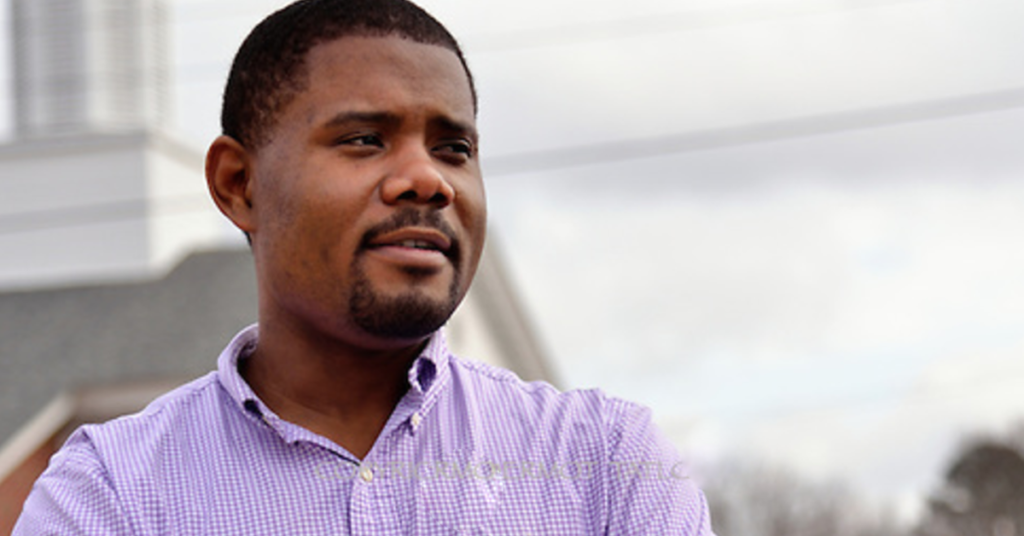
A judge has dismissed an Alabama mayor’s lawsuit against his city’s council, the latest development in a power struggle over who can appoint department heads and control spending. The Selma City Council passed an ordinance removing Mayor Darrio Melton’s authority to appoint a police chief, fire chief and tax collector. The council then overrode Melton’s veto, leading him to sue in October. The disagreement stems from two potentially conflicting sections of state code. The Montgomery Advertiser reports Mayor Darrio Melton and his attorney said Monday that they plan to appeal the decision, which Melton says transfers executive powers to the city council. City Council President Corey Bowie said the judge’s decision substantiates the ordinance. Melton also gave a state of the city address Monday, criticizing the council and media. Republished with permission from the Associated Press.
Treasurer sues as Selma government power struggle continues
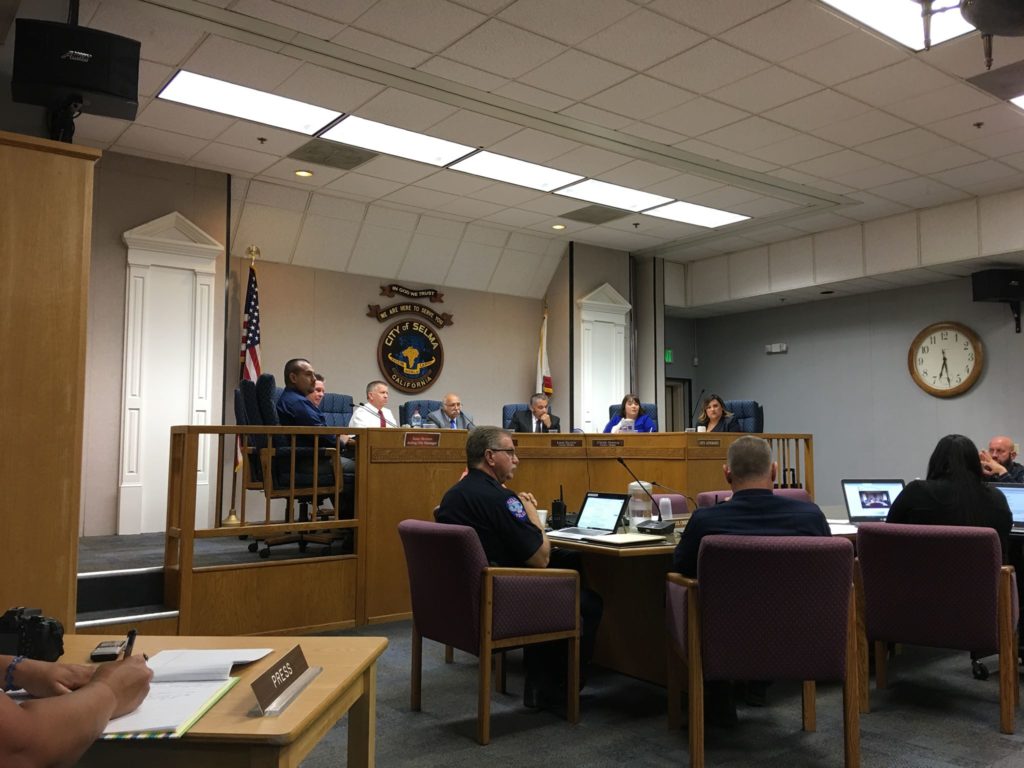
The treasurer of a city in Alabama’s Black Belt is suing to be reinstated to her position, even as city officials continue to wrangle with a budget crisis that sparked 68 layoffs. News outlets report Selma Treasurer Ronita Wade, placed on leave three times since 2017 by Mayor Darrio Melton, sued Melton and the Selma City Council on Tuesday in Dallas County Circuit Court demanding reinstatement. Melton placed Wade on leave for the third time on Sept. 26, the same day the city’s budget was supposed to be passed. He said it was because she was under investigation for criminal misconduct, but Wade said she knew of no such investigation. The Selma City Council has twice reinstated Wade, part of a power struggle over who will appoint department heads and control city spending. Earlier this month, Wade asked the council to reinstate her a third time, but the lawsuit says council members deferred the matter to an attorney citing the repeated suspensions. Wade wants a judge to reinstate her and block Melton from suspending her again. Melton has said Selma is broke and must cut spending or raise new revenue. On Wednesday, he attacked a City Council proposal to divert $400,000 earmarked for schools to reinstate laid-off employees. “If laying off over 60 city employees and reducing public service in their unbalanced budget wasn’t enough, they have stooped to an all-time low, targeting our children,” Melton said in a Wednesday news release. “They cannot balance the budget on the back of our children.” A share of a city sales tax, now about $400,000, was earmarked for education spending in 1982. Selma City Schools Superintendent Dr. Avis Williams said Wednesday that no one has contacted her about the subsidy. She said she hopes to meet with city officials next week. In an email sent to council members, Wade’s attorney Julian McPhillips claimed three city employees whose positions were eliminated by the council are still being paid by the city. McPhillips said the payments are illegal and must be stopped immediately. Kenneth Mendelsohn, Melton’s lawyer, said the council can’t legally eliminate positions appointed by the mayor, and that’s why those employees are still being paid. The council earlier voted to remove Melton’s ability to appoint Selma’s police chief, fire chief and tax collector. Melton sued, claiming the council can’t strip that power from him. Republished with permission from the Associated Press.
Selma City Council passes $17.4 million budget for 2019

During a special meeting called Wednesday, the Selma City Council passed a $17.4 million budget for Fiscal Year 2019. The budget passed with the support of Council President Corey Bowie, Councilmen Sam Randolph and Carl Bowline, Councilwomen Susan Youngblood, Miah Jackson, Angela Benjamin and Jannie Thomas. Meanwhile, Councilmen John Leashore and Michael Johnson abstained from the vote. Wednesday marked the first time since 2016 that a budget has been passed in Selma, according to the Selma-Times Journal, as the city functioned on an amended 2016-2017 budget last year. Last month, Mayor Darrio Melton presented a $22 million dollar budget to the council that they rejected. According to Bowie, Wednesday’s passed budget is a scaled down version of Melton’s.
Arrest warrant issued for Selma city councilman charged with public lewdness

An arrest warrant was issued on Thursday for a Selma city councilman. Councilman Samuel Randolph, who represents the city’s Ward 5, is being charged with public lewdness according to Selma Police Chief Spencer Collier. WFSA reports, “In Randolph’s case, the charges stem from an April 1 incident on Broad Street in which several narcotics officers were on a surveillance detail when they observed the councilman stop his vehicle. The officers reported Randolph then got out of the car, appeared to expose himself, relieve himself, and urinate in public.” Authorities are now urging the councilman to turn himself in and face the Class C misdemeanor charge, which Collier says can carry a sentence of up to a year in jail. “We are not talking about a murder here or a serious assault however we are talking about something that shocks the conscience. I have children. I don’t want my children driving down the road and seeing a grown men relieving themselves on the side of the road,” Collier told WFSA.
C-SPAN to feature Selma in 2018 Cities Tour
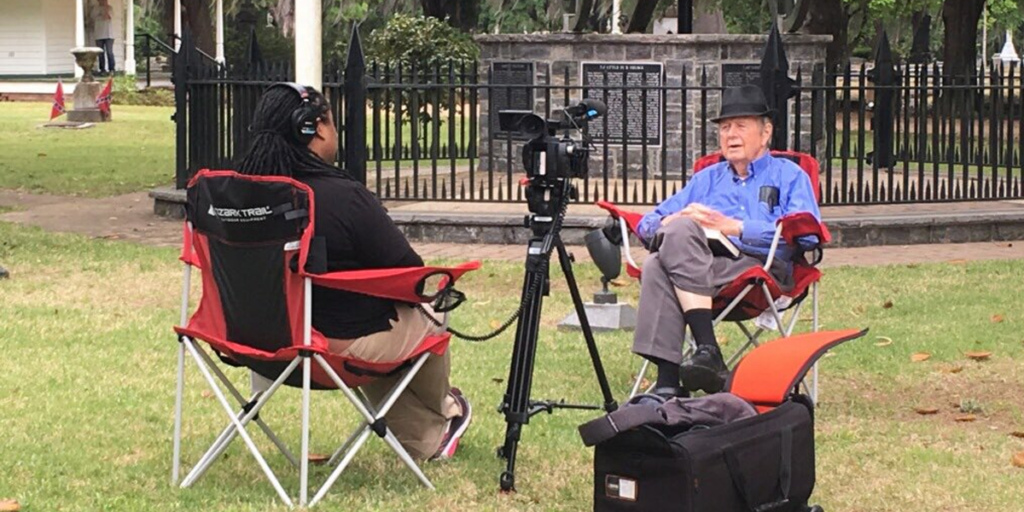
Selma, Ala.’s about to be in the national spotlight once again. C-SPAN is in Selma all week filming for its 2018 Cities Tour. The tour takes Book TV and American History TV on the road to feature the literary life and history of selected cities during special weekends on the public affairs network. “It not only introduces America to what makes each city special but hopefully maybe teaches you something about your own community as well,” said show producer Ashley Hill during a press conference at Selma City Hall on Monday. The network on Monday began live-tweeting its experience in Selma: Selma, AL was one of the South’s major military manufacturing centers during the #CivilWar. We spoke with historian Benny Austin about the Selma Ordnance & Naval Foundry, as well as the Battle of Selma, at the Old Depot Museum. #alabamahistory pic.twitter.com/pin1IUr1JN — C-SPAN Cities Tour (@CSPANCities) April 25, 2018 We toured @TheJacksonHome w/Jawana Jackson & learned about her mother Richie Jackson’s book “The House by the Side of the Road”. The Jackson home was host to Dr. Martin Luther King, Jr. during preparations for the #Selma to Montgomery Voters Rights March. #alabamahistory pic.twitter.com/S8ZyELuCuQ — C-SPAN Cities Tour (@CSPANCities) April 25, 2018 We toured #Selma’s Old Live Oak Cemetery to learn about the noteworthy people buried there, including former US Vice President under Pierce, William Rufus King. King was the one who gave the city of Selma its name, which means “high seat or throne”. #alabamahistory pic.twitter.com/7wcuBF4LDG — C-SPAN Cities Tour (@CSPANCities) April 25, 2018 Today we took a driving tour of #Selma w/Dianne Harris, a student foot soldier during the 1965 Voting Rights marches. Ms. Harris talked about her experiences & showed us sites such as the Edmund Pettus Bridge, Brown Chapel, and Dallas County Court House. See the tour 5/19-20. pic.twitter.com/EegR2a29T3 — C-SPAN Cities Tour (@CSPANCities) April 25, 2018 While at #Selma’s Old Live Oak Cemetery, we interviewed historian and author Alston Fitts on his book “Selma: A Bicentennial History”. Catch this and all our other Selma programming on C-SPAN 2 & C-SPAN 3, May 19-20. pic.twitter.com/WvG8WixTBJ — C-SPAN Cities Tour (@CSPANCities) April 25, 2018 While in Selma, C-SPAN is scheduled to film from the National Voting Rights Museum, the Selma to Montgomery National Historic Trail, the history of the Edmund Pettus Bridge, the Civil War, as well as Old Cahawba. The Selma segment will air nationwide May 19th and 20th.
Doug Jones announces first state tour
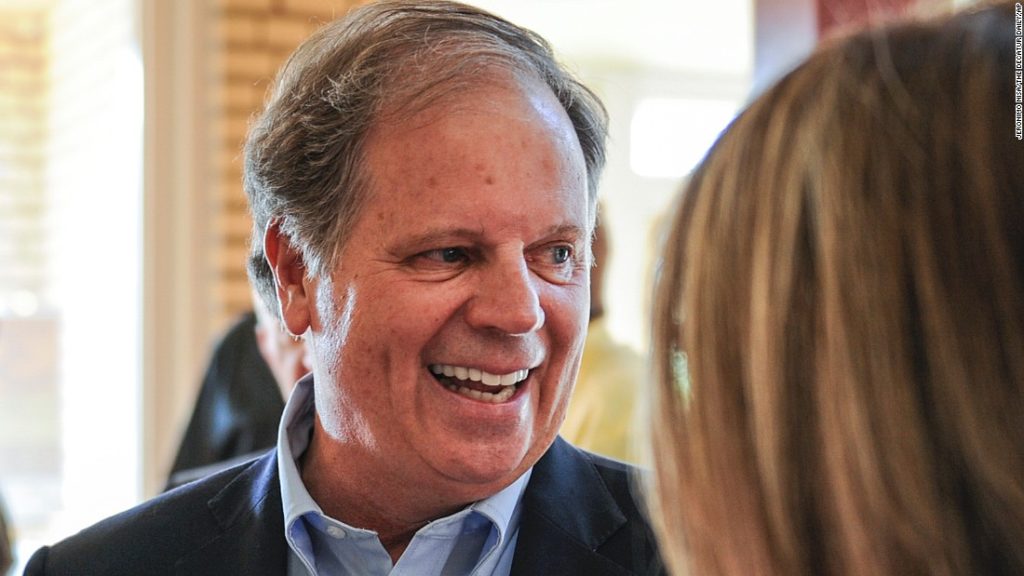
Senator Doug Jones announced a state tour of Alabama on Friday. This is Jones first tour since being sworn into office in January. Jones’ plan is to travel across Alabama, stopping in Birmingham, Huntsville, Montgomery, Mobile, Selma, Centreville, and Muscle Shoals, highlighting crucial changes that need to be made in the cities he visits. The newly elected U.S. Senator plans to speak on several issues including rural healthcare, defense, infrastructure, workforce development, and education. “It’s been a privilege to represent Alabama in Washington, but there’s nothing like getting home and hearing from folks first-hand,” said Jones. “I’m eager to hit the road and visit with as many Alabamians across the state as I can next week. We’re going to focus on the issues that are most important to our communities, from healthcare to jobs to education.” The tour begins in Mobile on Monday, Feb. 19 and ends in Montgomery Friday, Feb. 23. Here is a detailed list of all stops: Monday, February 19: MOBILE Where: 100 Addsco Road, Mobile, Ala. 36602 When: 3:00 p.m. Roundtable discussion about issues facing HBCU students Where: Bishop State College, 351 North Board Street, Mobile, Ala. 36603 – President’s Board Room When: 4:30 p.m. Tuesday, February 20: SELMA / CENTREVILLE Roundtable discussion on infrastructure, healthcare, and education with Selma Mayor Dario Melton and community leaders Where: Selma Performing Arts Center, 1000 Selma Ave., Selma, Ala. 36701 When: 10:00 a.m. Tour of the Rural Health Medical Program, Inc. to learn how the federally qualified community health center program helps them provide care Where: 101 Park Place, Selma, Ala. 36701 When: 2:00 p.m. Tour of Cahaba Medical Care Foundation to learn how the how the federally qualified community health center program helps them provide care and how they train medical students to serve in rural and underserved areas Where: 405 Belcher Street, Centreville, AL 35042 When: 4:15 p.m. Wednesday, February 21: BIRMINGHAM / MUSCLE SHOALS Visit to the Alabama Air National Guard 117th Air Refueling Wing Where: 5401 East Lake Boulevard, Birmingham, Ala. 35217 When: 8:45 a.m. Visit Northwest Shoals Community College to tour the Child Care Access Means Parents in School Program (CCAMPIS) Where: 800 George Wallace Blvd., Building 100 (Administrative Building), Muscle Shoals, Ala. 35661 When: 2:30 p.m. Roundtable with students in the Northwest Shoals Community College Workforce Development Program and David Fernandes, President, Toyota Motor Manufacturing, Alabama Where: 800 Wallace Blvd. Building 110 (Seminar Room), Muscle Shoals, AL 35661 When: 3:30 p.m. Thursday, February 22: HUNTSVILLE Where: Redstone Arsenal, 4488 Martin Road, Huntsville, Ala.(Garrison headquarters lobby) When: 4:00 p.m. Friday, February 23: MONTGOMERY Remarks at the YMCA Alabama Youth Legislature Where: RSA Activity Center, 201 Dexter Avenue, Montgomery, Ala. 36104 When: 11:45 a.m.
Selma to share part of $24M Kellogg Foundation grant to fight racism
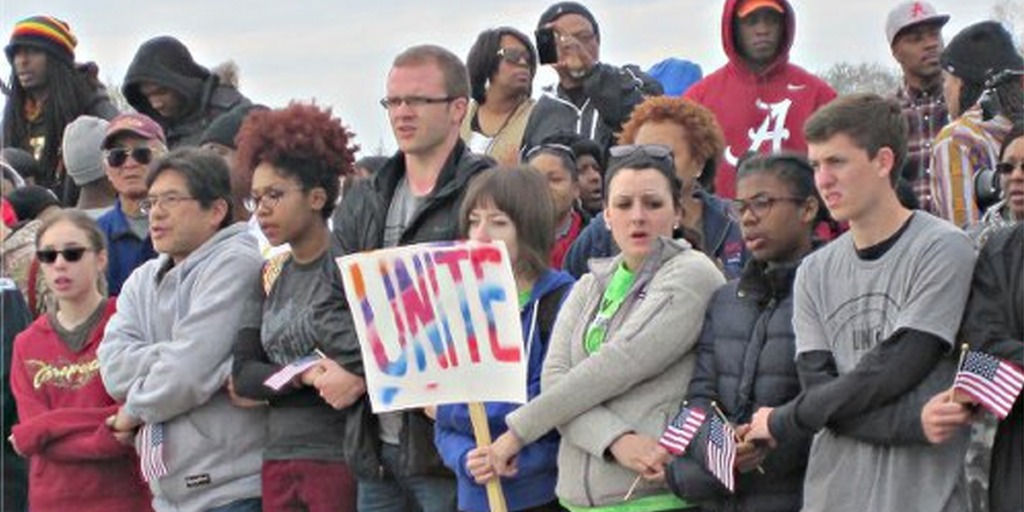
The next time you hear that familiar snap-crackle-pop as you pour milk over a bowl of Kellogg’s Rice Krispies, be reminded that the foundation behind your breakfast cereal is actively working to do some good in the world. The W.K. Kellogg Foundation (WKKF) — founded by breakfast cereal pioneer Will Keith Kellogg and one of the largest philanthropic foundations in the United States — announced Wednesday it will award $24 million in grants as part of its new racial healing initiative to Selma, Ala. and 13 other communities across the country. The grants are part of the foundation’s trailblazing program, Truth, Racial Healing & Transformation (TRHT), which is intended “to improve our ability as communities and as a country to see ourselves in each other, so that we can share a more equitable future for all children to thrive,” said La June Montgomery Tabron, president and CEO of the Kellogg Foundation. “This work is essential because we must bridge the divides in our country. Now more than ever, we must all act in big and small ways to help people heal from the effects of racism.” Moving into its implementation phase, WWKF will award 10 grants to organizations over the next two-to-five years in 14 places to implement the foundation’s TRHT process and framework. Using the framework as a guide, TRHT will endeavor to create local, regional and national transformational change in the areas of: Narrative Change: examining how to create and distribute new complex and complete narratives in entertainment, journalism, digital and social media, school curricula, museums, monuments and parks and in the way we communicate that can influence people’s perspectives, perceptions and behaviors about and toward one another so that we can work more effectively and productively toward community-based change. Racial Healing and Relationship Building: focusing on ways for all of us to heal from the wounds of the past, to build mutually respectful relationships across racial and ethnic lines that honor and value each person’s humanity, and to build trusting intergenerational and diverse community relationships that better reflect our common humanity Separation: examining and finding ways to address segregation, colonization and concentrated poverty in neighborhoods to ultimately ensure equitable access to health, education and jobs. Law: reviewing discriminatory civil and criminal laws and the public policies that come from them and recommending solutions that will produce a just application of the law. Economy: studying structured inequality and barriers to economic opportunities and recommending approaches that can create an equitable society. “The Kellogg Foundation has a strong belief in the inherent capacity of people to effect change in their lives,” Tabron added. “We are very optimistic that these leaders and communities will do the hard work needed to succeed in the transformation they seek.” Along with Selma, the grants are also going to: Alaska; New Orleans; Baton Rouge, La.; Buffalo, N.Y.; Chicago; Dallas; Los Angeles; Richmond, Va; St. Paul, Minn.; and Battle Creek, Flint, Kalamazoo and Lansing, Mich.
Terri Sewell: Remembering Bloody Sunday
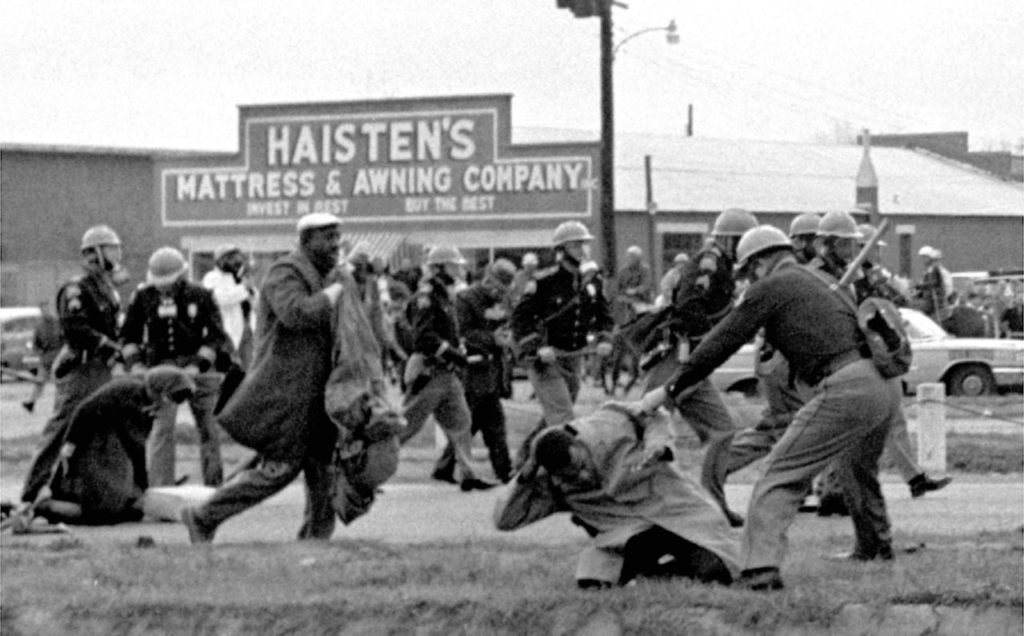
History is never stagnant. The saga of American democracy and the battle for the right to vote has its moments of inspiration, just as it has moments of defeat. The story this year’s chapter will tell is in our hands. Fifty-two years ago today, 600 marchers in Selma, Ala., brought the reality of racism and segregation into living rooms nationwide. That day, hundreds of voting rights supporters were viciously beaten by state troopers as they attempted to cross the Edmund Pettus Bridge. The brutal stories of Bloody Sunday reframed the issue of racism for the American public and ultimately led to passage of the Voting Rights Act of 1965 (VRA), our nation’s most powerful tool for protecting the vote. But the story of America’s fight for fair elections is never finished. After 48 years of bipartisan support from Congress and the White House, the VRA was gutted by the Supreme Court in its 2013 Shelby v. Holder decision, eliminating key protections for minority voters. On the 50th Anniversary of Bloody Sunday in 2015, our nation had an opportunity to undo that damage. That year, I joined President Barack Obama, President George W. Bush and a bipartisan group of more than 100 Members of Congress in Selma to commemorate the voting rights movement. It was an atmosphere of hope and unity in opposition to the hate and racism of our country’s past. Yet we returned to Washington, and Congress did nothing to restore the VRA. Today’s anniversary of Bloody Sunday is another opportunity to recommit to protecting voting rights for all Americans, but it is also a moment to reflect on the fresh urgency of that work. Old battles have become new again. This year’s commemoration of Bloody Sunday comes on the heels of the announcement that the Justice Department would drop challenges to a discriminatory Texas voter ID law, even after that law was struck down twice by courts for undermining minority voting rights. This year’s commemoration was also set against the backdrop of an executive order barring immigrants from Muslim-majority countries from coming into the United States. When Dr. Martin Luther King, Jr. completed his Selma to Montgomery march in 1965, after multiple attempts blocked by the police, he spoke to a crowd of nearly 50,000 supporters. In his speech, he told his audience that “no tide of racism can stop us.” This year I find those words have new resonance. Perhaps Dr. King was right – maybe hate is a tide: one that rolls in and out. This year, we face a rising tide of intolerance that’s had an immeasurable impact on my community. Last week, a bomb threat was called into a Birmingham Jewish community center in my district, the third threat in just one month’s time. I received messages from families who attend the center and were frightened for their safety and hurt by the threats against them. I’ve received messages from Muslim constituents who have family abroad, afraid that a travel ban will block them from seeing their loved ones. I’ve met with constituents worried for undocumented members of their community living in the United States. Looking back at photos from Bloody Sunday, the fear and pain that I see in the eyes of those who marched does not seem so foreign. I recognize the hurt of a people assaulted, threatened, and excluded because of who they are. But I also see courage. When I look at pictures of marchers like Amelia Boynton Robinson, I see a black woman who stood up to hate wherever she encountered it. This year, the 1965 Selma to Montgomery marches do not seem like a thing of the past, but instead a model for our work. We have to act as those in the voting rights movement did, and stand together for the rights of all Americans. I am a direct beneficiary of the movement. I was born the year that the Selma to Montgomery marches took place, and I owe those who fought, bled and died a debt of gratitude that I can never repay. But their story, and the story of America’s voting rights movement, is never finished. When Americans today suffer from some of the same injustices suffered 52 years ago, we cannot ignore the work left to be done. If the brutal stories of Bloody Sunday teach us anything this year, it’s that we must not only remember, but also dedicate ourselves to action. Together, we have a tide to turn back. ••• This article first appeared on TheHill.com. ••• Rep. Terri A. Sewell (D-Ala.) is serving her fourth term representing Alabama’s 7th District. She sits on the House Permanent Select Committee on Intelligence and was recently appointed to the House Ways and Means Committee.
Selma to commemorate”Bloody Sunday” will host largest voting rights commemoration event in US
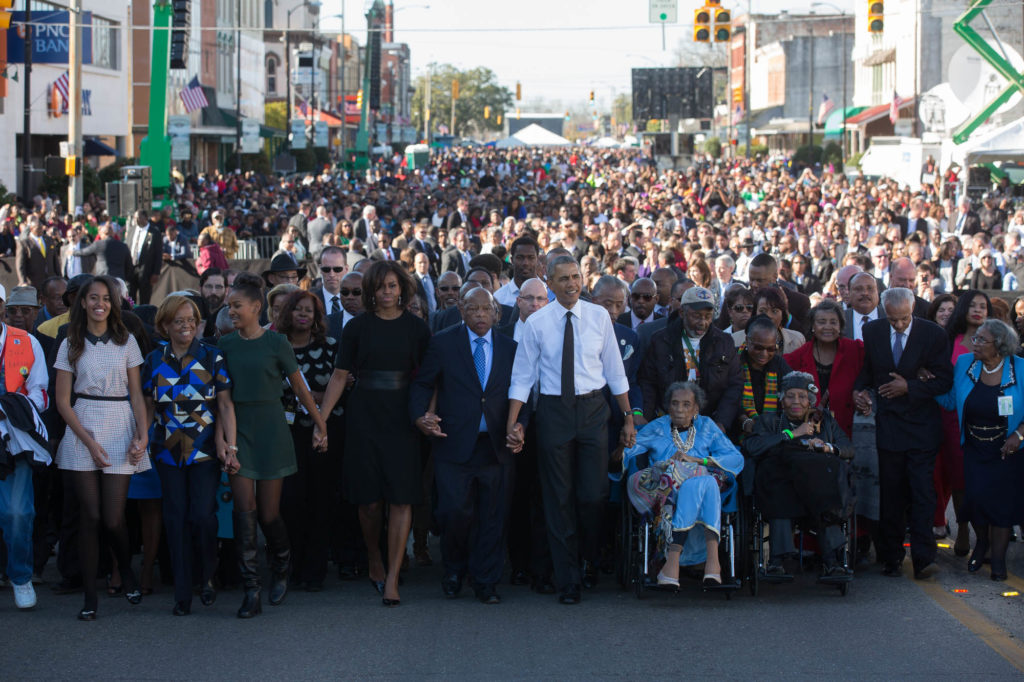
On Thursday, March 2 through Sunday, March 5, Selma, Ala. will host the largest voting rights commemoration event in the country — the Bridge Crossing Jubilee 2017 — remembering the 52nd anniversary of the Selma to Montgomery “Bloody Sunday” march. This annual event commemorates “Bloody Sunday,” when on March 7, 1965, a group of roughly 525 African American protesters planned to cross the Edmund Pettus Bridge on their civil rights march to Montgomery to demand the right to vote. At the bridge they where they were met by more than 50 state troopers and a few dozen men on horseback. When the demonstrators refused to turn back, they were brutally beaten, leaving at least 17 hospitalized, and 40 others injured. The violent attack, which was broadcast on national television, caught the attention of millions of Americans and was aptly dubbed “Bloody Sunday” and ultimately became a rallying point for civil rights leaders. While details of this year’s event are still being finalized, there will be workshops on the following topics: Voting Immigration Criminal Justice Education Economic Empowerment Health and Environment Special Workshop by SNCC Legends Additionally, the weekend will feature over 40 events including: Parade Blues Hip-hop and gospel music festival Step show Pageant Mock trial Unity breakfast Freedom Flame Awards Hip-hop summit Storytelling by Living History Makers March re-enactment and more Those interested in attending may purchase tickets online.


